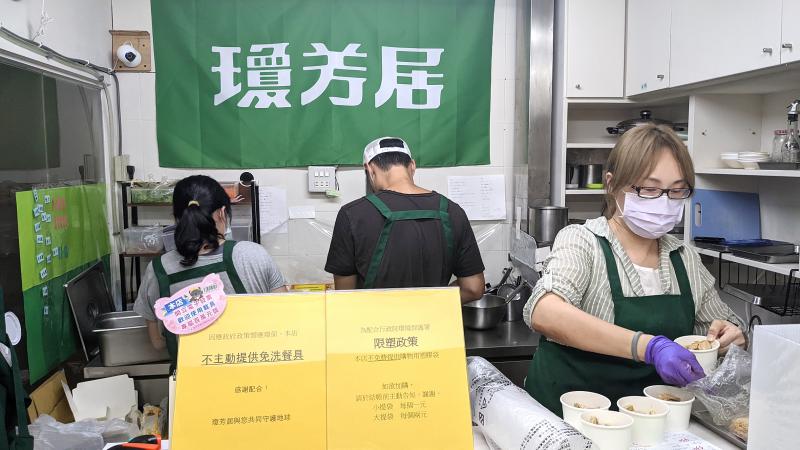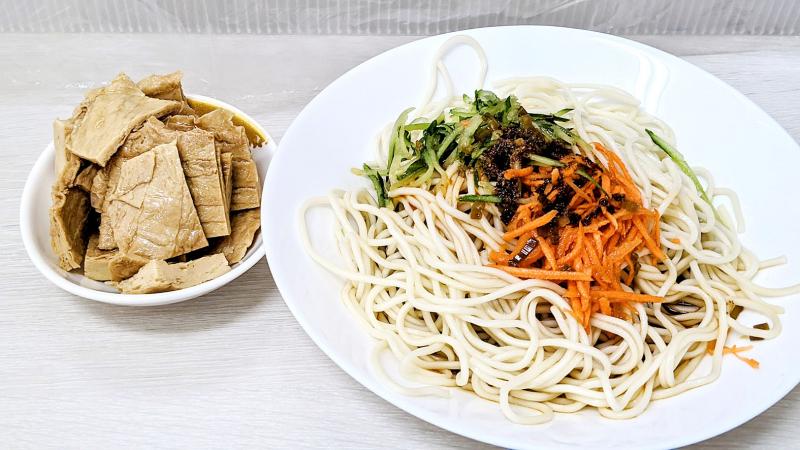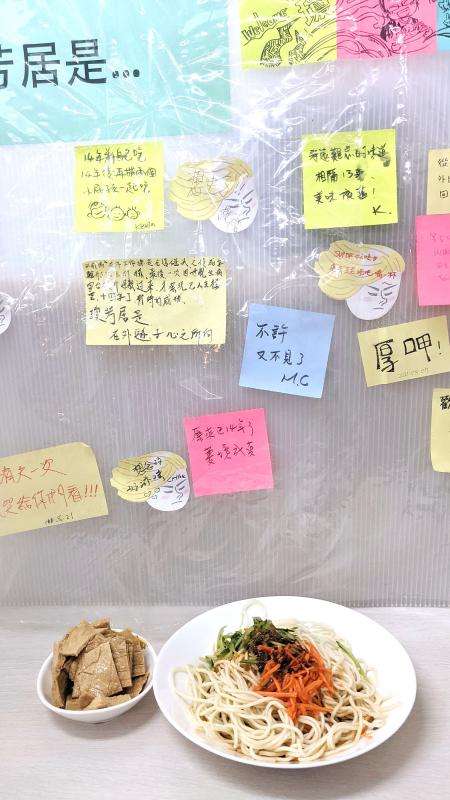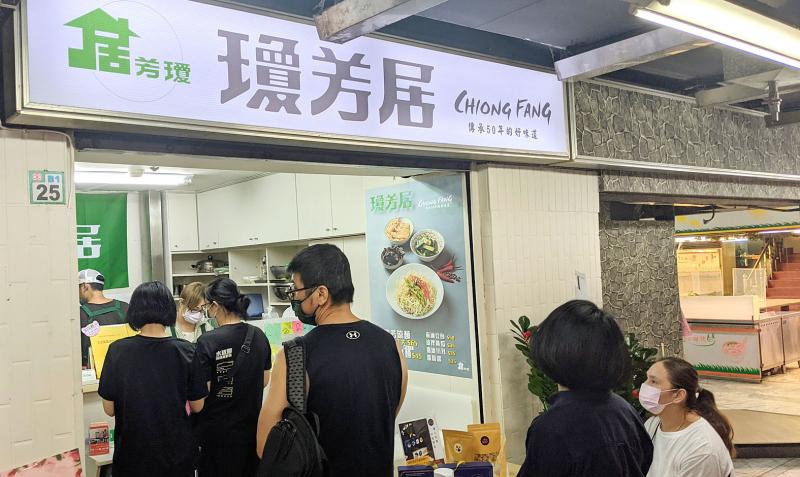I don’t think I’ve ever waited over an hour for any meal before — much less a bowl of NT$55 cold noodles in a dingy basement food court.
But as restaurants across the nation are shutting down due to COVID-19 restrictions, Chiong Fang’s (瓊芳居) staff have been overwhelmed to the point that they don’t have time to take bathroom breaks. It’s been this hectic since the tiny but legendary eatery in Ximending’s Wannian Building reopened in July after a 14-year hiatus.
As of last week, take-out is about an hour wait, while those who want to dine-in have to stand by even longer.

Photo: Han Cheung, Taipei Times
“Some people are getting mad at us for the waiting times, but what can we do?” a staffer tells me.
The Sichuan-style sour and spicy noodles are indeed pretty good, especially paired with the signature fried tofu skin marinated in a sweet sesame oil sauce still made by the shop’s founder, who is now in her 70s. The signature offering stands out among the innumerable cold noodle offerings in Taipei by eschewing sesame or peanut sauce for a simple mix of chili oil, vinegar, soy sauce, sugar and other spices.
But is it really worth the long wait? Well, if you grew up with it, I suppose. Nostalgia is the main draw here, and the staff assures me that everything tastes exactly as it did 14 years ago. This claim may be verified from the sticky notes plastered on the counter facing the tiny shop’s single indoor dining seat.

Photo: Han Cheung, Taipei Times
“If you disappear again, I’m going to cry!” reads one.
“I cannot believe that it has been 14 years. This is like a dream come true!” proclaims another.
“I used to meet my mother here when she was still working. My career took me overseas, but I later returned because my mother fell ill. We wanted to eat here, but discovered that it had closed down. It’s been 14 years, but it feels like it was yesterday.”

Photo: Han Cheung, Taipei Times
Apparently even the Taipei Times was a fan, as Chiong Fang (transliterated as Qiong Fang Ju then, before it got an official English name) was named among the paper’s top 10 restaurants of 2004. Fewer than half of that list are still around.
The noodles are very refreshing on a hot day, its complex but light flavor profile falling on the sour side with a nice spicy kick. The spiciness can be adjusted to taste. They go especially well with the sweet and juicy tofu skin, whose earthy, sesame-tinged essence complements the noodles well.
The noodle shop was born in the 1960s when the owner, a native of Zizhong County in China’s Sichuan Province, dreamt of the winning “secret sauce” that eventually earned her shop a loyal following. It moved to the Wannian Building when the shopping center opened in 1973. In 2007, the owner took a short break to deal with family matters, but she soon got sick and the shop remained shuttered.

Photo: Han Cheung, Taipei Times
The “we will be closed for a few weeks” note remained on the window for years, listing a phone number that was disconnected. With the store’s main sign still in place, Chiong Fang became an urban legend among Ximending’s youngsters who had only heard about how delicious the noodles were. Discussions about it would show up on online bulletin board system Professional Technology Temple (PTT) every once in a while — for instance in 2017 after popular YouTuber-turned-politician Froggy (呱吉, real name Chiu Wei-chieh, 邱威傑) called it the “tastiest cold noodles in human history in my opinion” in a video series on local cuisine.
“They never announced that they were closing, so for a long time, I stopped by every month to see if they had reopened,” Froggy says. “Eventually, I knew that my quest was hopeless, and I even stopped visiting Ximending.”
According to the staff, after the owner’s health greatly improved, she could only think of reopening the shop. They planned on returning last year, but things kept getting delayed due to the pandemic. They got tired of waiting and launched with level 3 COVID-19 restrictions still in place, hoping that the cases would soon go down. It didn’t matter that they were situated in the outbreak hotspot in Wanhua District (萬華) and only did takeout; people actually missed the noodles that much.
Many of the dishes Froggy reminisced of are no longer offered on the significantly reduced menu, which just includes cold noodles (NT$55 for small bowl, NT$65 for large), hot dry noodles (NT$45), bean curd skin (NT$50), two other side dishes and radish soup (NT$35 each).
I quickly finished my meal as there were still people waiting for that lone dine-in spot with 10 minutes until closing. I would definitely recommend trying these noodles, but if they don’t have any sentimental value to you, it’s better to wait a few weeks until the frenzy calms down.

The primaries for this year’s nine-in-one local elections in November began early in this election cycle, starting last autumn. The local press has been full of tales of intrigue, betrayal, infighting and drama going back to the summer of 2024. This is not widely covered in the English-language press, and the nine-in-one elections are not well understood. The nine-in-one elections refer to the nine levels of local governments that go to the ballot, from the neighborhood and village borough chief level on up to the city mayor and county commissioner level. The main focus is on the 22 special municipality

The People’s Republic of China (PRC) invaded Vietnam in 1979, following a year of increasingly tense relations between the two states. Beijing viewed Vietnam’s close relations with Soviet Russia as a threat. One of the pretexts it used was the alleged mistreatment of the ethnic Chinese in Vietnam. Tension between the ethnic Chinese and governments in Vietnam had been ongoing for decades. The French used to play off the Vietnamese against the Chinese as a divide-and-rule strategy. The Saigon government in 1956 compelled all Vietnam-born Chinese to adopt Vietnamese citizenship. It also banned them from 11 trades they had previously

Hsu Pu-liao (許不了) never lived to see the premiere of his most successful film, The Clown and the Swan (小丑與天鵝, 1985). The movie, which starred Hsu, the “Taiwanese Charlie Chaplin,” outgrossed Jackie Chan’s Heart of Dragon (龍的心), earning NT$9.2 million at the local box office. Forty years after its premiere, the film has become the Taiwan Film and Audiovisual Institute’s (TFAI) 100th restoration. “It is the only one of Hsu’s films whose original negative survived,” says director Kevin Chu (朱延平), one of Taiwan’s most commercially successful

Jan. 12 to Jan. 18 At the start of an Indigenous heritage tour of Beitou District (北投) in Taipei, I was handed a sheet of paper titled Ritual Song for the Various Peoples of Tamsui (淡水各社祭祀歌). The lyrics were in Chinese with no literal meaning, accompanied by romanized pronunciation that sounded closer to Hoklo (commonly known as Taiwanese) than any Indigenous language. The translation explained that the song offered food and drink to one’s ancestors and wished for a bountiful harvest and deer hunting season. The program moved through sites related to the Ketagalan, a collective term for the